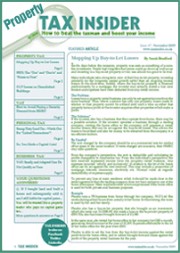Before you go, sign up to our free tax saving email course. Get 7 top property tax saving strategies in your email inbox that will help you save thousands in tax. Unsubscribe any time.
 In the last couple of years, HMRC have set up a number of “Task Forces” to concentrate on specific areas where they believe tax is being evaded. The latest batch, announced on 31 May this year, includes a “Property Income Task Force” which will concentrate on East Anglia, London, Yorkshire, and the North-East. In the last couple of years, HMRC have set up a number of “Task Forces” to concentrate on specific areas where they believe tax is being evaded. The latest batch, announced on 31 May this year, includes a “Property Income Task Force” which will concentrate on East Anglia, London, Yorkshire, and the North-East.
Some Task Forces, such as those dealing with Plumbers, Doctors, and e-commerce, have included “disclosure opportunities” for those with something to hide to come forward knowing in advance the terms on which their tax liabilities (and penalties for failing to disclose them at the right time) will be dealt with. No such arrangements have yet been announced concerning the Property Income Task Force, but at the time of writing there has been little time for action since 31 May – particularly in view of the additional day’s holiday granted to all civil servants in addition to the two Bank Holidays the rest of us had to make do with!
What sort of action will the Task Force take? In my early days as a trainee tax inspector, I was involved in a local version of a property income Task Force – it was an initiative dreamed up by one of the other inspectors in the Tax District in London where I worked. We concentrated on a small area of our district where there were many HMOs (houses in multiple occupation) and we served notices addressed to “The Tenant” on every address, requiring them to provide details of the rent they paid and who they paid it to.
Our little Task Force was a bit of a damp squib, to be honest, because our powers to enforce compliance with these notices were somewhat limited and ill-defined, but we did manage to unearth one landlord of a large number of bedsits and small flats who had not previously felt the need to declare his rental income, and took a substantial sum in tax, interest, and penalties off him.
Things have changed since then. The 2011 Finance Act included Schedule 23, which grants to HMRC “Data Gathering Powers” whereby they can serve notices on a wide variety of “Relevant Data-Holders” requiring them to provide information, on pain of a penalty of £300 in the first instance, followed by daily penalties of £60 for as long as the failure continues. Included in the list of “Relevant Data-Holders” is anyone paying rent and anyone collecting rent on behalf of another person.
In other words, HMRC have the power to demand that a tenant tells them who his landlord is and how much he is paying, and that a letting agent provides them with details of the rents he collects on behalf of his clients. I have no doubt that these powers are about to be used on a wide scale in the areas covered by the Task Force.
Whether or not any form of amnesty is announced, if there is a landlord who has not been declaring his rental income, it is in his own best interests to come forward and tell HMRC. This is because (even without an official amnesty) the rates of penalties are significantly lower for someone who makes an “unprompted disclosure” of his undeclared income, as compared to one who is tracked down by HMRC.
Not declaring your rental income is a “deliberate” failure, and the penalty ranges from 70% of the unpaid tax to 20%, but the crucial point is that even if you cooperate fully with HMRC the penalty can only be as low as 20% if you came forward before they found you. If HMRC find you out, the lowest penalty you can get by cooperating is 35%.
Practical Tip : Even if your rental business is not in one of the target areas, if you have not informed HMRC of its existence, you should do so without delay. This is a sample article from the monthly Property Tax Insider magazine. Go here to get your first free issue of Property Tax Insider. |


 Tax Articles
Tax Articles